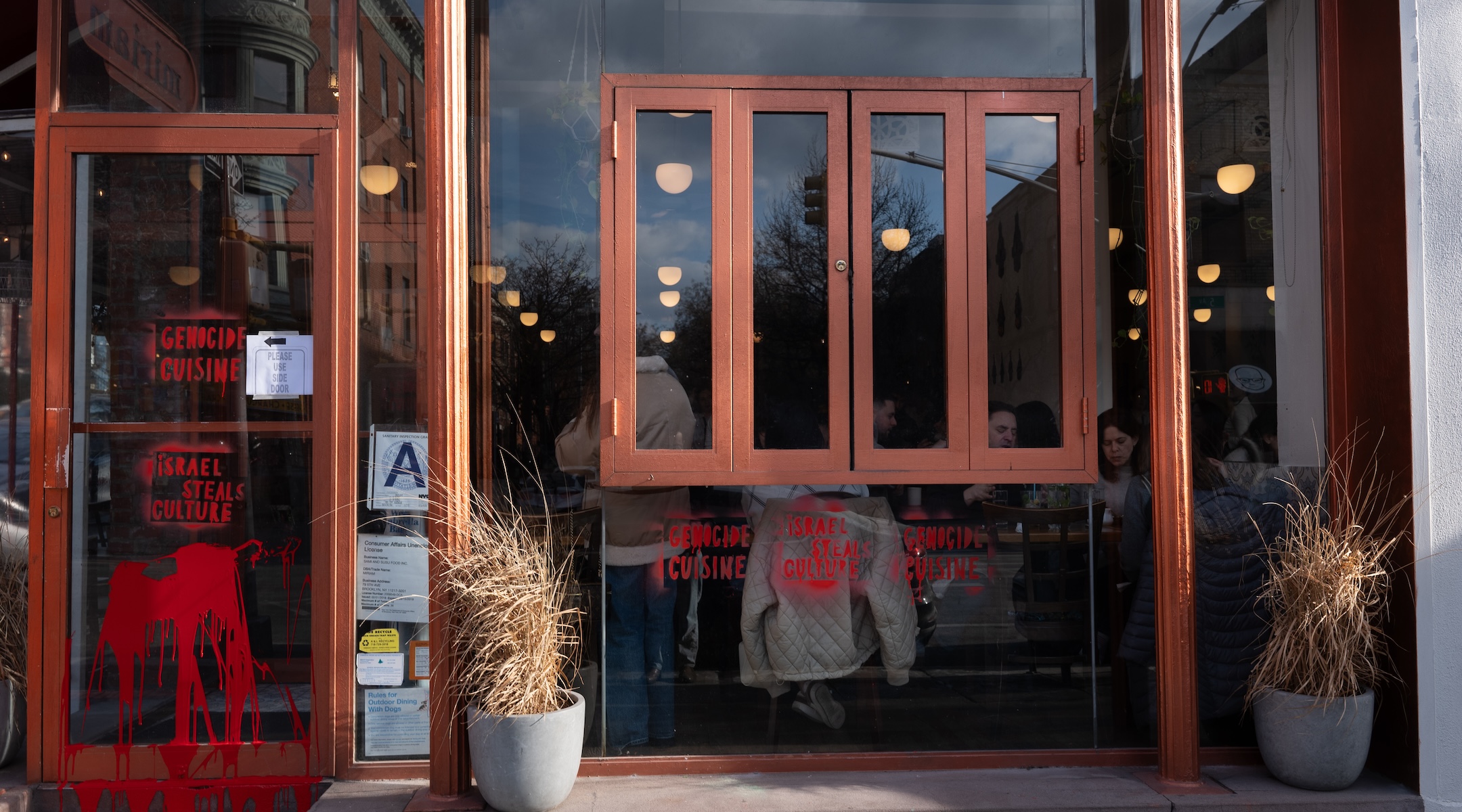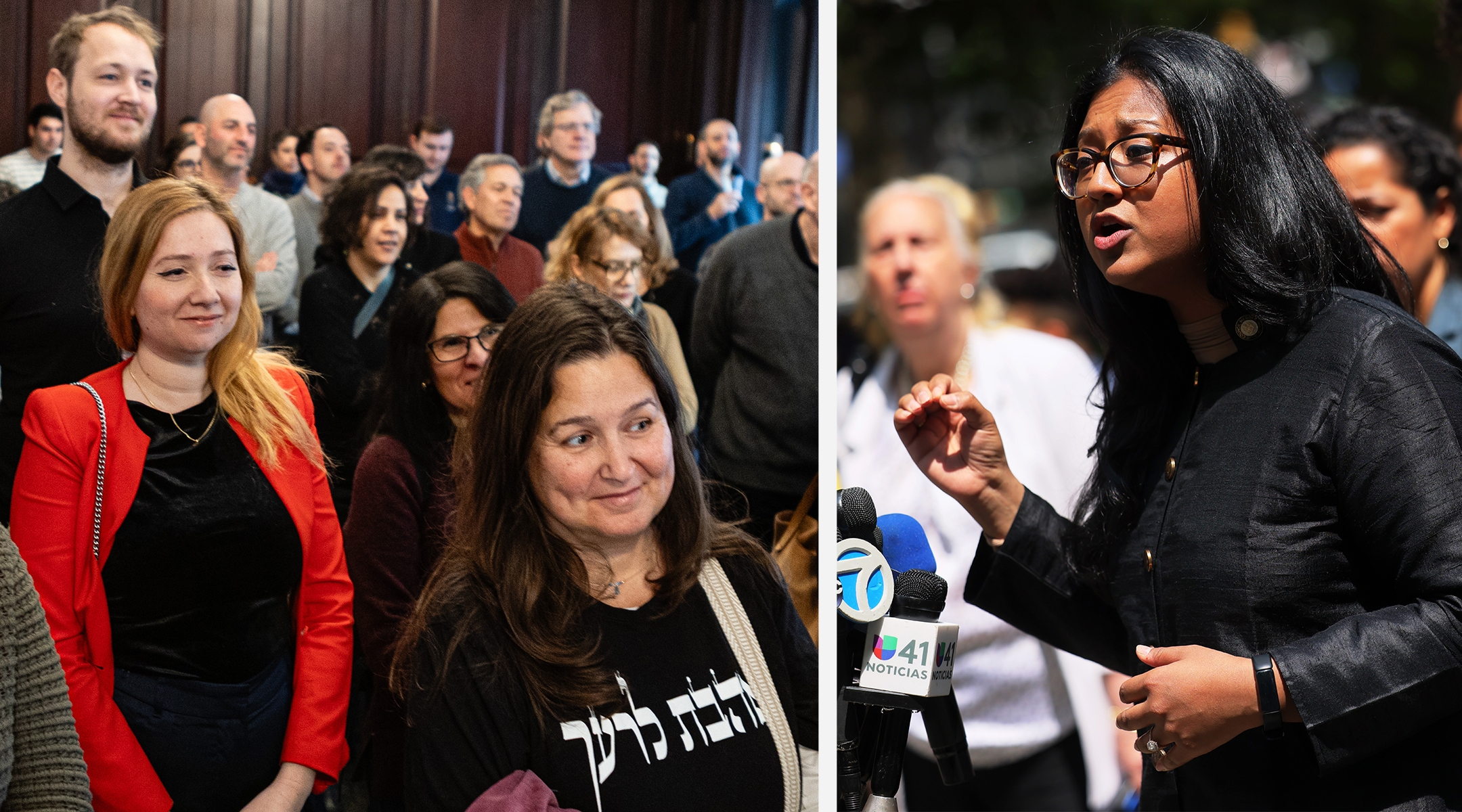When Miriam, a popular Israeli restaurant in Park Slope, was vandalized with anti-Israel graffiti last month, Jewish New Yorkers rushed to support the business. Brunch service that Sunday morning was packed, and by dinnertime, the regular folks were joined by politicians and community leaders. Social media was flooded with statements from elected officials decrying the vandalism.
But the response from one local politician, Shahana Hanif, a New York City Council member for the 39th district — which includes Park Slope and other parts of Central Brooklyn — was met with ire from many local Jews.
“I condemn the vandalism at Miriam, a cherished local Park Slope restaurant. This hateful act threatens the safety of our community,” Hanif posted on X, the same morning that “GENOCIDE CUISINE” and “ISRAEL STEALS CULTURE” were spray-painted all over the Israeli restaurant. “Acts of hate have no place in our city.”
Responding to Hanif’s post — which, notably, did not use the word “antisemitism,” though she did refer to the incident as “antisemitic vandalism” in a reply — some Brooklyn Jews took their representative to task for seemingly doing too little, too late to stem the tide of anti-Jewish sentiment that has risen in the city since Oct. 7, 2023. “Performative,” said one commenter. “We have been telling you this for over a year,” said another.
“It reeks of panic,” Andres Spokoiny, a Jewish resident of Park Slope, told the New York Jewish Week, adding that Hanif’s “big show” of condemning the incident was essentially “worthless.”
Spokoiny’s issue with Hanif, 34, is not necessarily the statement itself. Rather, it’s tied to a 16-month-long battle waged by Jewish Brooklynites who are frustrated by what they’ve seen as their elected representative’s lack of action when it comes to fighting antisemitism. As such, they created a grassroots political action committee last fall called Brooklyn BridgeBuilders. The group, according to their website, is dedicated to “holding elected officials accountable — Council Members and others — who enable, embrace, or refuse to speak out against hate.”
“Any leader who advocates violence — such as ‘globalizing the intifada’ or is indifferent towards antisemitism — should not hold office in a city as diverse as New York,” the website goes on to say.
In 2021, Hanif, who that year became the first Muslim woman elected to City Council, liked and retweeted a post that included the phrase “Globalize the Intifada.” In October 2023, she was arrested at a Democratic Socialists of America ceasefire rally; the following spring, she posted a photo from the Columbia University pro-Palestine encampment.
Hanif is up for reelection in November — though in deep-blue New York City, the June 2025 Democratic primary race will in all likelihood decide who represents the district. BridgeBuilders’ goal is to vote Hanif out of office.
“We try to make sure that our leadership reflects the values of the district,” said Spokoiny, who is the CEO of the Jewish Funders Network, a support group for Jewish philanthropies, though he clarified that he was speaking in a personal capacity as a Brooklyn resident. These values, he added, “are indeed liberal values, but also values of tolerance, of working together, of non-violence, of public safety.”
BridgeBuilders has been raising money and building a network of volunteers who will help “mobilize a grassroots operation … to educate voters” in the district, according to Joni Kletter, a labor lawyer who worked in the Bill de Blasio administration and co-founded the grassroots PAC.
And while they haven’t specifically endorsed a candidate, at least one serious challenger to Hanif has emerged: Maya Kornberg, a 33-year-old political scientist and senior research fellow at the NYU Brennan Center for Justice, who is Jewish.
Kornberg, who officially launched her campaign in December, is running as a “pragmatic progressive” alternative to the incumbent candidate.
“I consider myself most importantly to be a progressive candidate,” Kornberg said in a recent phone interview. But, she added, “the current Council Member has prioritized posturing and performative politics over pragmatic politics that are focused on bringing home solutions.”
In a statement to the New York Jewish Week, Hanif begged to differ. “My top priority, which should be the top priority of all Council Members, is making sure the people of our district feel safe,” she said.
“This is personal for me,” Hanif added. “I’ve been called slurs, faced vandalism, and had family, friends, and neighbors face reprehensible hatred and violence. That is why I’ve worked so hard to improve public safety — because I prioritize safety, not slogans — and to combat hate in all forms, especially antisemitism and Islamophobia.”
In October, Hanif told News 12 that she’d removed the “Globalize the Intifada” tweet, saying, “I recognize that it is a phrase that is antagonistic, discriminatory and hurtful to many Jewish people, and so I have learned, and I will continue to learn.”
Brooklyn BridgeBuilders isn’t the only group looking to vote out politicians who are perceived to be indifferent, at best, toward antisemitism. With its slogan, “Antisemitism is on the ballot,” the Jewish Voters Action Network, a nonprofit aiming to increase Jewish voter turnout, is focusing on 12 districts where they believe mobilizing the Jewish population can “make a difference in the election,” according to Becca Zebovitz, the organization’s executive director.
JVAN is focused on registering Jewish voters in 12 City Council districts — three of them in Brooklyn, including the 39th district. “That’s how we’re going to hold our politicians and our governments accountable for standing up to antisemitism,” Zebovitz said.

Customers showed up to support Miriam, the popular Israeli-owned restaurant in Park Slope, Brooklyn after it was vandalized by graffiti, Jan. 26, 2025. (Joseph Strauss)
At the moment, JVAN, which opened its new Brooklyn office last Friday, is focused on a campaign encouraging Jewish voters to register as Democrats, and educating them on why that’s a necessity in New York’s closed primary system. (Voters must be registered with a party in order to vote in its primary.) Their outreach includes phone banking, TV commercials, mailers and street campaigns. Volunteers also use the Israeli app UpVote, which allows users to see their contacts’ voter registration statuses and reach out accordingly.
Many of Brooklyn BridgeBuilders’ 50-some members are volunteering with JVAN, in pursuit of registering as many Jewish voters as possible ahead of the city’s Feb. 14 deadline for changing party affiliation.
“Look, the political world, what it is right now, many of us identify with our political stances,” Zebovitz said. “To say to someone, you know, ‘I need you to change your registration,’ is a much harder conversation to have than, ‘Hey, you need to vote because it matters.’”
But, Zebovitz added, “When it’s coming from someone you know, someone you trust, it’s much more effective. So that really is where we’re trying to bring in as many volunteers as possible — to reach out to the people they know and have those more personal conversations.”
Ramon Maislen, a leading organizer with BridgeBuilders, has been volunteering a few hours per week with JVAN, and said he knows at least 20 other people doing the same in the 39th district.
But this level of involvement is relatively new for Maislen, who is also one of the Jewish members of the Park Slope Food Coop, where a group of members has called on the store to boycott Israeli products. Maislen filed a state human rights complaint alleging antisemitic and anti-Israel harassment there.
“I was not particularly active politically,” he said. “I had no problem with Hanif — [it’s] not even that I had no problem, I didn’t really think about her, to be totally frank. It was just not something that came up on my radar.”
Then came Oct. 7, 2023. The following day, the Democratic Socialists of America — of which Hanif is a member — hosted a pro-Palestinian rally at Times Square that drew widespread backlash. “So once I realized that my own Council Member was sort of aligned with these people, I was pretty upset,” Maislen said.
In March, Hanif met with a group of 16 pro-Israel Jewish community leaders who hoped, among other things, that their Council member would agree to publicly condemn Hamas and acknowledge and commit to combatting the neighborhood’s “troubling rise in anti-Israel and antisemitic graffiti and stickers,” Kletter wrote in an email to the New York Jewish Week.
Instead, Kletter said, the group left “stunned.” Hanif told them that she was “OK with the Free Palestine” graffiti, unless it was on a synagogue or Jewish religious symbol. She also said during the meeting she “[does not] support Hamas” and that Jews “absolutely” have a right to self-determination, but did not commit to the group’s request to make a public statement condemning Hamas. (The next month, and days after Spokoiny co-wrote an op-ed titled “Council Member Shahana Hanif Ignores Jew Hatred,” Hanif wrote in her own opinion piece that she “categorically denounce[s] the atrocities committed by Hamas on Oct. 7.”)
The events of that hour-long meeting ultimately sparked the creation of Brooklyn BridgeBuilders. “We thought something had to be done to get this person out of office,” Spokoiny said.
Of course, not every Jew in the district is on board with Brooklyn BridgeBuilders’ mission. Jewish Park Slope resident Adam Ring, for example, is volunteering for Hanif’s reelection campaign. Ring, 42, pointed out that Hanif “co-sponsored and helped pass Intro 532, which helps schools like my children’s Jewish day school pay for their increased security needs.”
According to Kletter, BridgeBuilders has currently raised $65,000 from 175 different donors, 85 to 90 percent of whom live in Central Brooklyn.
“This is a true grassroots initiative,” Spokoiny added. “We’re all people in the district. The money that was raised is mostly in-district money.”
For constituents like Spokoiny who are involved in mobilizing Jewish voters, the Feb. 14 deadline is an important one. Once it passes, though, the next step will be encouraging registered Democrats to vote in the primary.
“Literally every vote counts,” Spokoiny said. “And incumbents have an advantage. So it’s doable — but it’s very hard work.”
The New York Jewish Week brings you the stories behind the headlines, keeping you connected to Jewish life in New York. Help sustain the reporting you trust by donating today.





